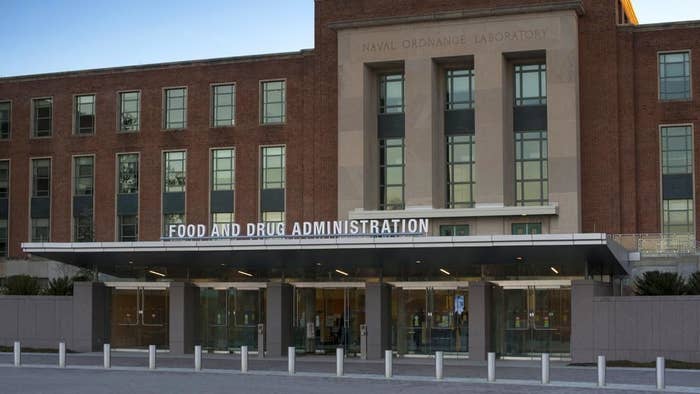
The FDA on Friday approved a second drug meant to increase a woman's sex drive.
Approval of the injectable drug, bremelanotide, sold as Vyleesi by Amag Pharmaceuticals Inc., follows the unsuccessful 2015 launch of the drug Addyi, a controversial "female Viagra" pill intended to spur sexual desire.
"There are women who, for no known reason, have reduced sexual desire that causes marked distress, and who can benefit from safe and effective pharmacologic treatment," Hylton Joffe of the FDA's Center for Drug Evaluation and Research, said in a statement. "Today’s approval provides women with another treatment option."
Under study for more than a decade, Vyleesi increases the activity of a hormone linked to lowered anxiety and moderately improved desire in past studies. But "the mechanism by which it improves sexual desire and related distress is unknown," according to the FDA. Amag claims that nearly 80% of the women who took the drug in a 24-week study continued injecting it afterward, typically two or three times a month.
"It is important that women suffering with this condition have a choice of treatment options," said Anita Clayton of the University of Virginia School of Medicine, who headed studies of the drug's safety, in an Amag statement. The impact of low sexual desire, she added, "goes far beyond the bedroom and can often result in anxiety, loss of vitality, self-esteem issues and relationship stress."
Overall, around 20% to 30% of women report low sexual desire in surveys, although only about half of them see that as a problem. The first drug aimed at these women, Addyi, failed to win customers partly due to being prohibited with alcohol. Amag and its backers are hoping that Vyleesi, injected from a pen dispenser about 45 minutes ahead of sex, will get luckier. (The FDA has approved at least five different drugs formulated to improve erections in men.)
"Whether a sometimes effective Addyi or an injectable Vyleesi, pharmacotherapy is not usually a complete solution in and of itself," psychologist Michael Perelman of the Payne Whitney Clinic of New York Presbyterian Hospital told BuzzFeed News. "But when combined with sexual counseling, a potent mixture is available which together will help reduce suffering for millions of women.”
For Vyleesi, the FDA didn’t convene an advisory committee meeting to debate the drug’s safety, and the full clinical trial results of the drug's largest test on 1,200 women has not yet been published. Preliminary results were presented at a scientific meeting in May, reporting slightly increased sexual desire among women, regardless of whether they were or weren't taking oral contraceptives. The FDA's Lyndsay Meyer told BuzzFeed News that the agency "did not recognize any issues requiring expert review" of the drug, which is why it passed on the advisory committee vote common before approval of most new drugs.
About 1 in 4 women taking the drug in clinical trials reported significant increases in their assessments of their sexual desire, according to the FDA. Its most common side effects were mild nausea, flushing, injection site soreness, and headaches, according to Amag. About 40% of women who took the drug felt nausea the first time they tried it, in studies, and the drug also increased blood pressure in some women. The agency doesn't want women to take it more than 8 times a month.
"Vyleesi does not enhance sexual performance," the FDA noted in its statement. "About 1% of patients treated with Vyleesi in the clinical trials reported darkening of the gums and parts of the skin, including the face and breasts, which did not go away in about half the patients after stopping treatment."
"A big issue for this medicine impacting use, as with Addyi, will be the price," prescription drug expert Walid Fouad Gellad of the University of Pittsburgh told BuzzFeed News. He also called the lack of published results concerning. "The publication would give a better sense of full range of safety and tolerability, and what exactly trial participants looked like, which will be important to matching with use in real life."
the National Women’s Health Network "urges women to avoid using [Vyleesi] until more is known about its safety and effectiveness" https://t.co/XB1E10RvCw
Sex educators meanwhile have widely criticized the concept of treating lowered sexual desire with drugs instead of therapy or couples counseling. Amag, in turn, has launched an "unBlush" publicity campaign aimed at raising awareness of low female sexual desire as a treatable condition, viewing education as a key to increasing sales of its drug. Financial analysts see Vyleesi drug sales approaching $150 million a year by 2030.
The drug will be commercially available in September through specialty pharmacies, according to Amag.
UPDATE
The post has been updated with comment from the Amag statement.
